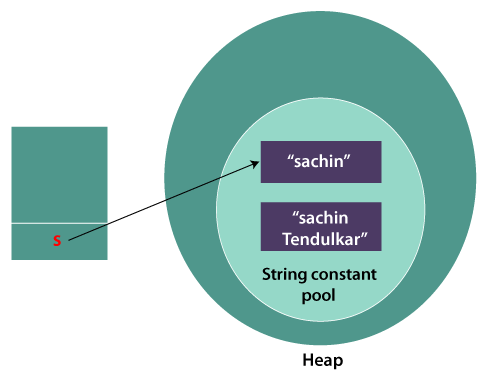Why Are Strings Immutable in Java? Enhancing Code Reliability
Wiki Article
What Is Immutable Strings and Just How It Functions
In the realm of programming, recognizing the idea of immutable strings is critical for developing robust and safe and secure applications. Unalterable strings describe strings that can not be changed after they are created, guaranteeing information integrity and predictability within the code. This fundamental principle plays a vital duty in numerous programs languages and provides an one-of-a-kind approach to handling data. By exploring the complexities of how unalterable strings function, one can reveal a world of advantages and opportunities that can elevate the quality and performance of software program advancement.The Fundamentals of Immutable Strings
Unalterable strings, as a basic idea in programming, are personality sequences that can not be transformed when they are developed. This means that once a string is appointed a worth, that worth can not be changed. In languages like Python and Java, strings are immutable objects, bring about numerous ramifications in regards to memory management and information stability.Among the crucial advantages of unalterable strings is that they give a sense of safety in information control. Considering that the material of an immutable string can not be modified, it guarantees that the original information stays undamaged, lowering the risk of unintentional adjustments during program implementation (Why are strings immutable in Java?). This building likewise simplifies debugging procedures, as programmers can trust that as soon as a string is defined, its worth will not be accidentally altered
When a brand-new string is developed based on an existing one, rather than changing the original string, the brand-new worth is kept independently. In general, understanding the essentials of immutable strings is critical for grasping programs principles and enhancing code efficiency.
Advantages of Immutable Strings
Building upon the safety and security and effectiveness advantages of immutable strings, their advantages extend to enhancing code reliability and simplifying concurrent programs jobs. By being immutable, strings can not be modified after production, which removes the risk of unplanned adjustments in the information they keep. This inherent immutability makes certain that once a string is created, its worth stays constant throughout the program's execution, decreasing the chances of insects triggered by unexpected modifications.Additionally, unalterable strings contribute to code dependability by making it easier to reason regarding the state of a program. Because strings can not be transformed, developers can trust that a string will always hold the very same worth, simplifying debugging and upkeep initiatives. This predictability brings about more dependable and stable codebases.

Execution in Shows Languages
Within various shows languages, the consolidation of immutable strings is a fundamental aspect that influences exactly how information is handled and adjusted within code frameworks. The implementation of unalterable strings differs across different programming languages, with each language supplying its very own devices to support this concept.

On the other hand, languages like C and C++ useful content do not have integrated assistance for unalterable strings. Developers in these languages have to manually implement immutability by enforcing regulations within their code to avoid direct alterations to string things.
Ideal Practices for Collaborating With Unalterable Strings
When managing immutable strings in programs languages like Java and Python, adhering to best techniques ensures reliable and safe information manipulation. Among the crucial finest techniques is to make use of StringBuilder or StringBuffer rather than straight controling strings, specifically when dealing with substantial concatenation procedures. These courses provide mutable alternatives for string adjustment, aiding to prevent unnecessary memory allowances and improving performance.An additional ideal technique is to utilize string interpolation or format functions offered by the language instead of hands-on concatenation. This not just improves readability yet also aids in preventing typical mistakes such as unintentional string adjustments. Additionally, when working with delicate information such as passwords or API tricks, it is crucial to prevent storing them as simple text in unalterable strings. Using safe storage devices like char ranges or specialized collections for handling delicate info assists reduce safety and security dangers related to immutable strings.
Real-world Applications and Instances
Discovering useful applications of immutable strings in different sectors exposes their considerable impact on information stability and system integrity. In the medical care field, unalterable strings play a critical role in making sure the protection and confidentiality of patient data. By protecting against unauthorized adjustments to sensitive details such as clinical documents and prescriptions, immutable strings assist keep conformity with rigorous privacy laws like HIPAA.Monetary organizations also benefit from the immutable nature of strings to enhance the security of client data and purchase documents. Immutable strings aid avoid scams and unauthorized modifications to economic information, giving a robust defense best site versus cyber hazards and guaranteeing the trust and self-confidence of clients.

Verdict
Ideal techniques for functioning with immutable strings include preventing straight alterations and article source making use of methods that return brand-new string items. Real-world applications of immutable strings consist of data encryption, caching, and string adjustment jobs.Immutable strings refer to strings that can not be altered after they are produced, making certain information integrity and predictability within the code. When a brand-new string is created based on an existing one, instead than modifying the initial string, the brand-new worth is kept independently.In languages like Java and Python, strings are immutable by default, meaning that once a string things is produced, its value can not be transformed - Why are strings immutable in Java?. Ideal techniques for functioning with unalterable strings include preventing direct alterations and utilizing techniques that return brand-new string objects. Real-world applications of unalterable strings include information file encryption, caching, and string adjustment jobs
Report this wiki page